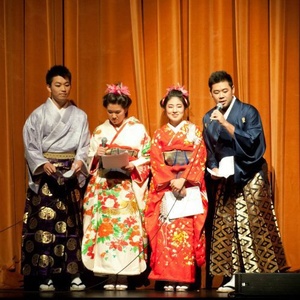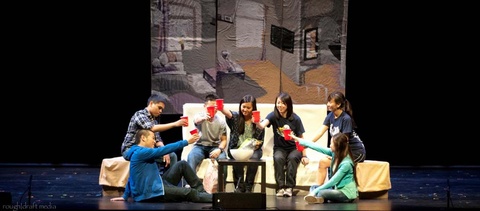Legacy.
What was the first thought that came to mind when you read that word?
For many of us, the word legacy evokes a deep feeling of power and history. It is something that many of us reflect upon in the present and aspire to create anew. Being an undergraduate at UCLA and a part of the Nikkei Student Union (NSU), I have come to glimpse a small portion of our history, our struggles, and our shared experiences. I say glimpse because compared to many of you who have experience in our community, I am very much a novice. However, what I have come to write about today is not about the content of our legacy. I have come to write about the role of the current generation in building a progressive legacy and the direction that our legacy is heading towards from my perspective.
Before I begin, I want to clarify the difference between a personal legacy and a community’s legacy. For many college students, we strive to create a legacy that is ours, a personal legacy we can call our own before we leave college. Now, there’s nothing wrong with doing this. In fact, this is something that we should all strive to achieve as aspiring leaders in our communities. However, I find that many people get caught up in the moment and forget about the bigger picture. We want to do something but we forget about our community.
When we think about legacies, we must always go beyond our own agenda and remember our past. We forget that a legacy is created overtime and is a culmination of movements that past leaders have created in hopes for a better future and a better society. One reason why we forget is because our history is a long one. As a community, we have existed in America for over a century. As time goes on, generation gaps become more apparent and history slowly fades away. We cannot let this happen. We must continue to remember the hopes that have been invested into us. If we forget, then we cannot build a complete picture of our community’s legacy. By remembering, we can realize the hopes that have been invested into us.
However, this does not mean that we can forget about the future. If we only remember our history and carry it on, the longevity of our legacy is guaranteed but the content is jeopardized. What I mean is that our legacy cannot grow. When we think about the future, we have to think of a future that will be today. In other words, we have to be the change. We have to achieve the future in the moment. This is what it means to be a progressive leader and not a reactionary one. The catch here is that we, as leaders of our communities, need to be progressive while honoring our past if we want to build a progressive legacy.
From my perspective, I believe that the JA community has developed a progressive legacy, but at the same time, it seems to me that many people feel lost about where to head next. Looking at our history, it was clear to us what we needed to do and who we were fighting for. If we start at the beginning of our history, we can see that most Issei came here in order to pursue the American Dream but were faced with challenges of discrimination in a highly xenophobic time. Despite their situation, the Issei put their hopes into their children, the Nisei, in order to keep their legacy alive and overcame the Alien Land Laws.
However, xenophobia continued to escalate and eventually exploded during World War II. The result was one of America’s darkest moments in history—Executive Order 9066. Although many Nisei wanted to forget their incarceration experience and bury it forever, some of them including their children—the Sansei—would not rest until the United States admitted their injustice. This desire accumulated into a movement that ultimately ended with redress and reparations. Stopping here, it is easy to see what our community was fighting for, social justice. More specifically, we were fighting against institutionalized racism so that we could realize the dreams and hopes of our ancestors, but now what?
Now, it is our turn, but even though it is, we have come to a complacent time period. The problems that were once in our face or blatantly apparent have “disappeared,” and people do not act because they do not see a clear reason to. The problem with this is that people tend to look for the result of injustices and not the source of injustices. This is seen repeatedly throughout our history. The Alien Land Laws and Executive Order 9066 were the results of xenophobia, but the source was the mindset that the majority of Americans had. It was not until 1988 that America officially recognized their injustice, but just because injustice has been recognized does not mean that it has disappeared.
As a shin-Nisei, one of the things I have come to realize about the shin-Nisei community is that it has been excluded from the Japanese American community because of the differences between their respective history and culture. Growing up, I never heard about J-league, incarceration, or redress and reparations even though I am Japanese American. Even when I joined NSU, I always wondered about why I was called shin-Nisei and not Nisei. Although I understood the historical relevance of the word “Nisei” to many older Japanese Americans, I did not want to be labeled shin-Nisei. The reason for this is because I did not want to undermine a legacy that we have created as Japanese Americans in the Asian American movement.
Remember Yuji Ichioka? Remember why he coined the term Asian American? He coined this term because he understood the significance of our identity and that an identity is not something someone else can define for us. For those of you who came to watch NSU’s 2012 Cultural Night, the reason why I decided to feature shin-Nisei’s was because I could see that history was repeating itself, and I did not want to see the destruction of our legacy by our own hands. This is one reason why we cannot forget about our legacy, and it is at this moment that we have to strive for change so that we can continue to develop our legacy.
Nevertheless, I am glad that efforts have been made in our community to address the dichotomy between the shin-Nisei and JA community, but efforts have not been consolidated. As a student activist part of the Asian Pacific Coalition at UCLA, I have come to realize that one of the biggest problems that different communities face is solidarity, whether it may be within or between different communities. We forget that we are actually fighting for the same thing, and sometimes, we even forget what we are fighting for or what we have fought for.
I can go on to talk more about our past legacy, but the point is that within three generations, we have been able to create and establish a living legacy, and this is something that I do not want to see end. Although I have said this, I would like to note that I am not saying people have not been doing anything. I am writing to people who have not realized their role in our legacy. I think this is why many people think, “What can I do? I’m just one person,” or “That doesn’t affect me so I don’t want to get involved.”
This is why I differentiated between our personal legacy and our community’s legacy. We have to strive to go beyond ourselves while remembering the legacy we have established. Once we have done that, we will be able to see the direction of our community and how we can continue to develop our legacy.
One of my dreams is for our community to be the leading community among our nation and that we will set the standard of how communities should think and act. No longer should we think about what we can do for our community, but we will take action for others, not because we are better than them but because we have a responsibility as a community. Many minority communities look up to the JA community because of our history. We have made great strides to walk against the institutionalized discrimination against us, but just because we are in a better place in society does not mean we can stop fighting. What we are fighting for is social justice, not for ourselves but for everyone. Let’s not take advantage of our history. Let’s act in solidarity with other communities.
© 2012 Albert Quach




